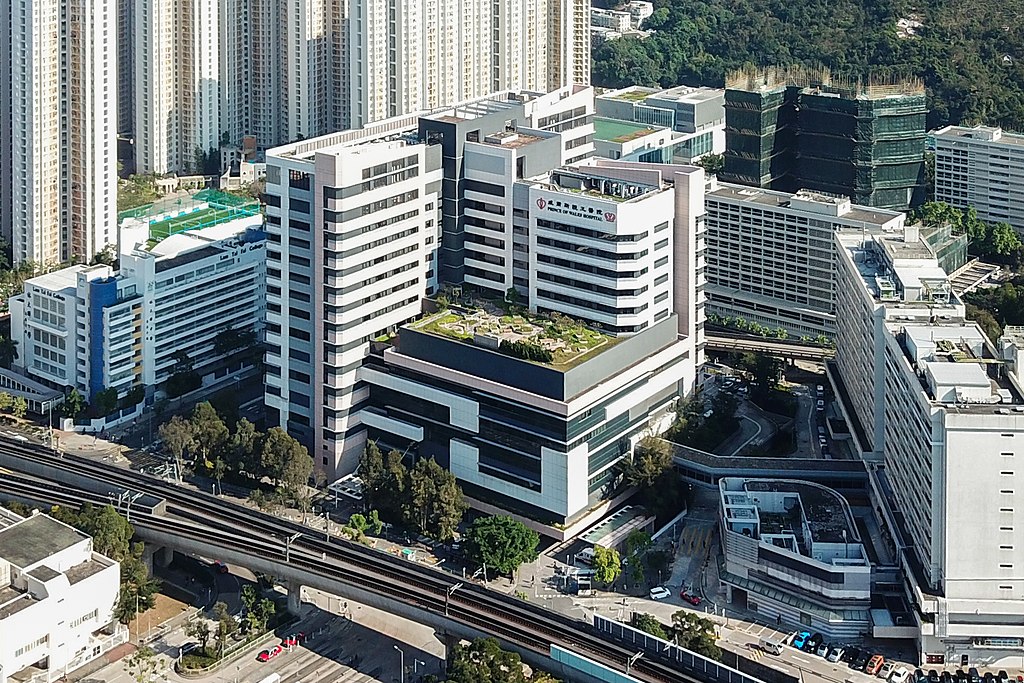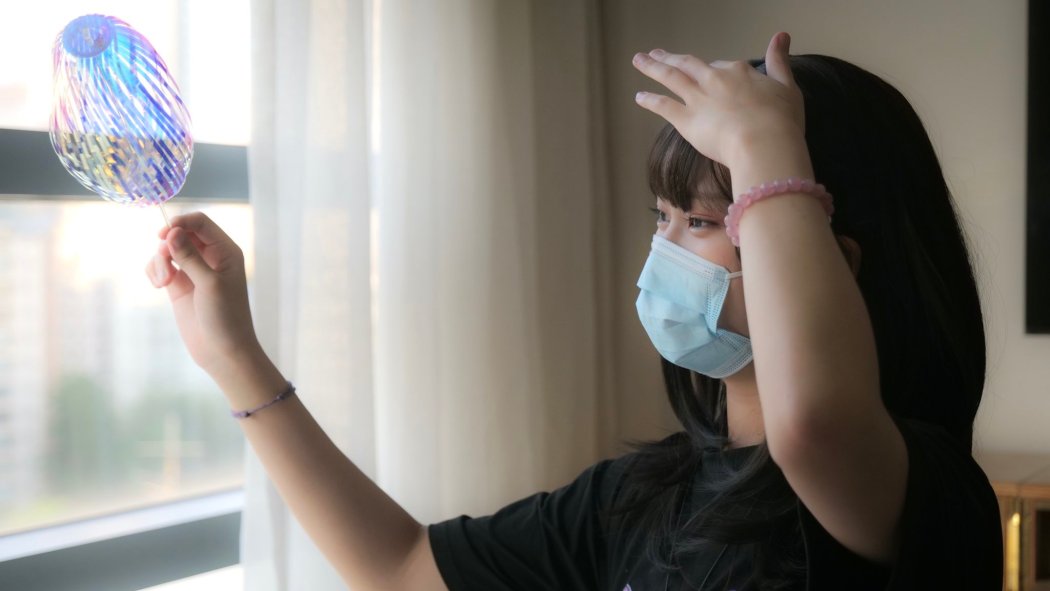Transgender teens in Hong Kong say they have been “cast adrift” by years-long waits for lifechanging treatment at public hospitals, as government policy bars doctors from offering transgender health services to patients under the age of 18.
“A few members who were turning 18 in a couple of days were turned away from booking an appointment at the Gender Identity Clinic (GIC),” Liam Mak, the co-founder of Quarks, a local organisation providing peer support to young transgender individuals and promoting awareness through public education, told HKFP.

Many of those who turn to Quarks are underage pupils. They speak of shared experiences, such as being unable to get a foot in the GIC’s door before entering adulthood and frustration at the long waiting times once they do.
“There was nothing I could do but to wait. That’s the policy,” said Mak, 20, with a sigh. Mak struggled with his gender identity since he was in pre-school, feeling the sex he was assigned at birth was a mismatch.
Mak began his gender transition with hormone replacement therapy (HRT) when he turned 18 in 2019, two years after he first sought treatment at a public hospital. Gender-affirming hormone treatment aims to align a person’s physical characteristics with their gender identity.
“I have always regretted not having HRT earlier,” Mak said.
Age limit
The GIC, the city’s first and only one-stop gender clinic at the Prince of Wales Hospital in Sha Tin, has been providing services to adults with issues relating to gender since 2016 through a team of psychiatrists, surgeons, endocrinologists, social workers, therapists and more.
Patients undergo psychological assessments, a basic physical examination and hormonal tests to establish a diagnosis. Psychiatrists may make referrals to endocrinologists for HRT, according to each patient’s clinical situation and personal wishes. And patients will experience a minimum of 12 months “real life experience,” or living in the gender role that is congruent with their gender identity, before potentially undergoing gender confirmation surgery.
However, the gender clinic has a strict age limit and will not provide services to patients under 18.

Internationally, the question of when a minor can begin to transition continues to inspire debate. Guidelines drafted by experts from the World Professional Association for Transgender Health (WPATH) last December recommend that adolescents not only undergo rigorous mental health assessments, but that they show “several years” of “well-documented… evidence of persistent gender incongruence or gender nonconformity/diversity” before receiving hormones or having surgery.
The document also notes the issue of “informed consent,” adding that gender affirming treatment may only be offered if an “adolescent demonstrates the emotional and cognitive maturity required to provide informed consent/assent for the treatment.” Internationally there is no agreed age limit at which minors can pursue treatment without a parent or guardian’s approval.
Additionally, changes associated with many of the procedures involved in transitioning can be long-lasting or even irreversible. As a result, doctors and health experts remain divided on when treatment of minors should begin.

In the UK, under 18s seeking treatment for gender identity issues will usually be referred to clinics under the Gender Identity Development Service, run by publicly funded healthcare system the National Health Service (NHS).
“Most treatments offered at this stage are psychological rather than medical. This is because in many cases gender variant behaviour or feelings disappear as children reach puberty,” the NHS website states. Some patients will be referred to a hormone specialist if they meet “strict criteria,” but the emphasis remains on psychological support.
The UK’s “largest and oldest” gender clinic operated by the NHS accepts referrals from those aged 17, but does not offer appointments before a patient’s 18th birthday.
Veteran psychiatrist Dr Gregory Mak, who worked at the Prince of Wales Hospital from 2008 to 2012, told HKFP why he believed treatment at Hong Kong public hospitals was inaccessible to under 18s. “Because of the limited experience and manpower in the current public hospitals to serve a niche group,” he said. “It would involve a lot of family [work] compared with those transgender adults.”

Dr Mak, who specialises in treating people with gender identity issues, went into private practice in 2013. Around a quarter of his patients are trans teenagers. He said that in Hong Kong, many families struggle to accept that their children are experiencing gender identity issues, triggering difficult discussions and, possibly, damaging consequences.
Early intervention a double-edged sword?
“Many trans teens are actually very, very depressed about the growth of breasts, the enlargement of the penis,” Dr Mak said.
He said that “early intervention,” such as the prescription of puberty blockers, was becoming more common overseas as the distress of childhood gender dysphoria could be worsened by the sexual maturations of puberty. “Gender dysphoria” replaced the archaic diagnostic label “gender identity disorder” in the fifth edition of the Diagnostic and Statistical Manual of Mental Disorders (DSM-5), published in 2013, to remove the stigma associated with the word “disorder.”

The UK’s NHS defines gender dysphoria as “a sense of unease that a person may have because of a mismatch between their biological sex and their gender identity,” adding that it “may be so intense it can lead to depression and anxiety and have a harmful impact on daily life.”
“Try[ing] to suppress or even stop… puberty changes… can give time for the clients to think clearly about the direction or the treatment that they want in future,” said Dr Mak.
The WPATH guidelines advise that a patient should have reached the second Tanner stage of puberty, which is when physical changes become visibly apparent, and is at least 14 years old before receiving puberty blocking hormones. And while the Endocrine Society in the US suggests gender affirming therapy could start at 16 with the support of “an expert multi-disciplinary team that includes a mental health professional,” the age at which people can access hormone therapy varies globally.
However, Dr Willy Wong, a specialist in psychiatry, said that undergoing such treatment at a young age could be a double-edged sword, describing it as irreversible.
We have to be cautious in taking care of paediatric patients
Dr Willy Wong, psychiatrist
“It is a big deal. There are some cases where young patients regret or have changed their mind… it is important to let them understand the decision and the consequences, for example taking hormones for the rest of their life,” Dr Wong told HKFP.
Dr Wong added more assessments were required when diagnosing gender incongruence and gender dysphoria in adolescents compared to adults.

“We have to be cautious in taking care of paediatric patients,” Dr Wong said.
A spokesperson for the Hospital Authority (HA) told HKFP that patients under the age of 18 were treated at child and adolescent psychiatry clinics near their homes, offering greater convenience when it came to attending follow-up appointments. The GIC only takes referrals once a patient turns 18.
Quarks has urged the HA to consider scrapping the GIC’s age limit, however, the government body said it had “other considerations” and scarce resources. “We are still on a mission to end its underage ban,” said Mak from Quarks.
Challenges facing trans teens
“The policy [that GIC is solely for adults] is utter nonsense. Underage trans teens also share the same medical needs,” said Yuki Liu, a 17-year-old trans girl who turned to a private clinic for hormone therapy two years ago after being unable to seek treatment at a public hospital.
Despite the higher price, she decided to pursue treatment before turning 18. Liu spends more than HK$1,000 per quarterly visit, whereas consultations at a public hospital cost just HK$135 for the first visit, and HK$80 for subsequent appointments.

“I really hate living as a boy. At least making changes in appearance comforts me,” said Liu.
Liu, who became uncomfortable with her assigned sex at birth when she was 14, experienced mental health problems and self-harm after being called “disgusting” by classmates.
Doctors suggested that she speak to school counsellors, but Liu said that most of them did not have relevant knowledge or training in LGBTQ issues.
“I was told to grin and bear it by the counsellors,” Liu told HKFP. “There was a time when I decided to grow my hair long, which stirred outrage among teachers. One of them asked me to wear a wig instead. I knew she was being helpful but it was heart breaking.”
Nearly half of transgender people in Hong Kong showed moderate to severe symptoms of depression and more than three-quarters contemplated suicide, according to a survey conducted by the Chinese University of Hong Kong in 2021. Half of the respondents experienced discrimination in employment, education, or the provision of goods and services.

Wing Tse, a counsellor from Pride Line, a 24-hour hotline providing support to Hong Kong’s LGBTQ community and their families, said Pride Line wanted young transgender individuals to know that they were not excluded from society.
The hotline service comes with diverse counselling services, emotional support, and peer support groups. Tse suggested trans teens consider trying clinical psychological services offered by the Social Welfare Department or other NGOs.
From July to September 2021, Pride Line received a total of 1,009 calls asking sexual orientation and gender identity-related questions.
Long waits for treatment
Hong Kong does not have official data on its transgender population, but according to the Food and Health Bureau, public hospitals saw on average 720 patients with “gender identity disorder” annually from 2015 to 2020, with attendance showing a rising trend.
According to the HA, the provisional median waiting time for new routine cases to get an appointment at a psychiatric specialist out-patient clinic, such as the GIC, was 32 weeks in 2019-20.

Dr Mak believed the waiting time for the GIC was longer than that because more patients were willing to seek treatment and there was a shortage of medical professionals.
According to Quarks, the average wait for a new appointment at the GIC exceeded 43 weeks. The longest wait the organisation has heard of was nearly a year.
“Doctors [at the] public hospital said I have to wait at least nine years to have the sex reassignment surgery. [It is] almost impossible to wait,” Lau Pui-laam, a co-founder of Quarks, who was planning to have transfeminine bottom surgery to remove her penis in Thailand, told HKFP.
Lau said she had been told that between eight and 10 gender confirmation surgeries were performed at public hospitals each year. From 2010 to 2015, a total of 40 patients had full or partial sex reassignment surgery at public hospitals. Lau said had been placed on the waiting list for an appointment in 2031.

Demand for specialist psychiatric services has long exceeded what is available, with the attrition rate among full-time psychiatrists at public hospitals reaching 7.2 per cent in 2020.
At a meeting with the HA last year, Quarks and Hong Kong-based concern groups Gender Empowerment, Transgender Equality Hong Kong, and the Association for Transgender Rights, called for an expansion of service capacity. The authority said the increase in average waiting time was due to staff loss, resources allocation and the Covid-19 pandemic.
Greater gender inclusivity
In 2019, the World Health Organization followed the DSM-5 in announcing it would remove “gender identity disorder” from its global manual of diagnoses, reclassifying it as “gender incongruence,” and moving it from the “Mental and behavioural disorders” chapter into a new chapter, “Conditions related to sexual health.”
Last year, the HA accordingly renamed the Gender Identity Clinic, once called the Gender Identity Disorder Clinic. The authority has pledged to foster a more inclusive and welcoming space by introducing gender-neutral public facilities in the redevelopment of the Prince of Wales Hospital, which is currently underway.

Dr Mak urged the government to review the rights of transgender individuals and to put an end to stigmatisation and discrimination through public education.
He also suggested offering more specialist training for doctors or healthcare professionals. Those who were interested, he said, should join international organisations such as the Asian branch of WPATH, Asia PATH, which provide regular training and supervision.
“I hate to say [it], but transgender people are among the most marginalised, even within the LGBT community, and many of us really need help,” Lau said.
Support HKFP | Policies & Ethics | Error/typo? | Contact Us | Newsletter | Transparency & Annual Report | Apps
Help safeguard press freedom & keep HKFP free for all readers by supporting our team

Original reporting on HKFP is backed by our monthly contributors.
Almost 1,000 monthly donors make HKFP possible. Each contributes an average of HK$200/month to support our award-winning original reporting, keeping the city’s only independent English-language outlet free-to-access for all. Three reasons to join us:
- 🔎 Transparent & efficient: As a non-profit, we are externally audited each year, publishing our income/outgoings annually, as the city’s most transparent news outlet.
- 🔒 Accurate & accountable: Our reporting is governed by a comprehensive Ethics Code. We are 100% independent, and not answerable to any tycoon, mainland owners or shareholders. Check out our latest Annual Report, and help support press freedom.
- 💰 It’s fast, secure & easy: We accept most payment methods – cancel anytime, and receive a free tote bag and pen if you contribute HK$150/month or more.
MORE Original Reporting
HKFP has an impartial stance, transparent funding, and balanced coverage guided by an Ethics Code and Corrections Policy.
Support press freedom & help us surpass 1,000 monthly Patrons: 100% independent, governed by an ethics code & not-for-profit.









